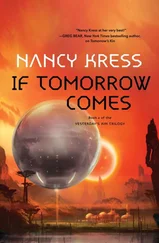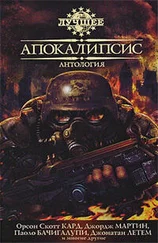The usual thought came: Is she dead?
But no. Gram’s chest moved with shallow breaths. In the early days, when cancer was new to them both, she had fretted over every moan, gasped at every imitation of a death mask on Gram’s brown, lined face. Gram was nearly seventy, but she had never looked like an old woman until the cancer. Her white hair was still full and springy, but now her face looked like she would not last the day, which was how she always looked.
But Gram always did last the day. And the next.
The bell was always on Gram’s mattress, though she had not had the strength to ring it in a long time. The hospital-grade bed had cost a fortune, equipped with an inflated mattress that was gentler against Gram’s breaking skin. It didn’t work as well without its electric pump, but Nayima kept it inflated with an old bicycle pump. Not enough, maybe, but it was inflated. The county had shut off the power to the entire area after the evacuation.
Nayima felt the magnitude of her impending tasks. Should she dress and treat Gram’s sores before or after the move? Damnation either way.
Later, she decided. She didn’t want to face the sores with the move still waiting. The move would irritate Gram’s sores with or without a cleaning and dressing first, but maybe after was best. She wished her cell phone worked, not that there was anyone to call for advice. An internet search would have felt like a miracle. The lack of advice wearied her.
As if her loud uncertainty had awakened her, Gram’s eyes flew open. Gram’s eyes had once been the brightest part of her, though they were milky now.
“Baby?” Gram said.
Nayima stepped closer to the bed. She could smell that the wounds needed cleaning—the dead flesh odor she hated. She slipped her hand over Gram’s dry palm. Gram squeezed, but did not hold on.
“I’m here, Gram,” she said.
Gram stared with the same eyes that had probed Nayima when she came home late from “movies” with her first boyfriend smelling of weed and sex. But this time, the questions were too big and vast for words, with answers neither of them wanted to hear. Nayima hadn’t let Gram watch the news or listen to the radio in weeks, so Gram didn’t know how many others were facing illness. She didn’t know the neighbors had left.
“We have to move to Mr. Yamamoto’s house,” Nayima said. “Too many fleas here.”
“The… cats?” Gram said.
“They’re fine,” Nayima said. That was probably a lie. She had stopped feeding Gram’s four cats and locked them out after the evacuation, so the cats had left too. She’d cried about it at the time, but at least cats could hunt.
“Tango too?” Gram’s eyes grew anxious. Maybe Gram had heard the lie in her voice.
“Tango’s still mean and fat,” Nayima said.
Was that a smile on Gram’s face? Gram had asked her to keep a single framed photo displayed on the table beside her bed, snapped the first summer Nayima came home from Spelman: the overfed black cat, Tango, was in Gram’s lap while Nayima hugged Gram from behind in her powder blue college sweatshirt. Nayima’s best friend, Shanice, had taken the photo. The glowing pride on Gram’s face haunted Nayima now.
Gram’s eyes started to flutter shut, but Nayima squeezed her hand and they opened again, alert. “I’m going to push you in the bed, Gram,” she said, “but it will hurt.”
“That’s okay, baby,” Gram said. That was Gram’s answer to every piece of bad news.
Nayima had stockpiled pain pills with help from Shanice, who was an R.N. and had raided the meds as soon as she caught wind of how bad things were going to be. Thanks to Shanice—who had moved next door when they were both in the sixth grade—Nayima had a box of syringes, hundreds of oxy pills, saline packs for hydration, ointment and dressing for bedsores, bed pads, and enough Ensure to feed an army. But Gram hadn’t been able to swallow anything on her own since before the neighbors left, so all Nayima could do was crush the pills in water and inject them. Gram’s arms looked like a junkie’s.
The smell was worse when Nayima leaned over Gram to inject her crushed pill. Nayima’s throat locked. How would she clean her and scrape away Gram’s dead skin later if she could barely stand the smell now?
Gram’s eyes were flickering again, ready to close.
“Are you hungry?” Nayima asked.
Gram’s lips moved, but she didn’t say anything Nayima could hear.
Nayima didn’t smell feces, so she would postpone the rest—the changing of the urine-soiled bed pad, the gentle sponge cleaning, the bedsores, the feeding. All of that would wait until they had moved to Mr. Yamamoto’s flea-free home.
He always had been meticulous, Mr. Yamamoto. Even his roses were still on schedule.
“I love you, Gram,” Nayima said, and kissed her grandmother’s forehead. She allowed her lips to linger against the warm, paper-thin skin across the crown of Gram’s skull.
Gram’s breath whistled through her nose. She whistled more now, since the smoke.
Luckily, the cancer wasn’t in Gram’s lungs, so breathing had never been a problem. But breathing would be a problem for both of them soon. It hadn’t occurred to Nayima to ask Shanice for oxygen, not back then. She hadn’t known the fires were coming. Even the dust masks Nayima wore outside had just been in a box left untouched for years in Gram’s garage. She wore them until they fell apart; she only had twenty-two more.
When Nayima fitted a new dust mask across her grandmother’s nose and mouth, Gram didn’t even open her eyes.
The first scream didn’t come until they were well beyond the front door, when Nayima had lulled herself into thinking that the move might not be so bad. One of the wheels wandered off the edge of the driveway, rattling Gram’s bed. Her scream was strong and hearty.
“Sorry,” Nayima whispered, her mantra. “I’m sorry, Gram.”
Gram’s eyes, closed before, were wide and angry. She glared at Nayima, then turned her gaze to the sky. Even with pain lining her face, Nayima saw Gram’s bewilderment.
“It’s smoke,” she said. “Brushfires.”
The bewilderment melted away, leaving only the pain. Most of Nayima’s life with Gram, there had been wildfires every other summer. They both had grown accustomed to the sirens and beating helicopters that were still Nayima’s daily and nightly music. She heard a far-off helicopter now, and a choppy, angry voice from an indistinct loudspeaker. She braced for popping gunshots, but there were none. Not this time.
“Mr. Yamamoto took a trip with his grandchildren, so he said we could use his house,” Nayima said, trying to distract Gram, but a bump elicited a shriek. “I’m sorry, Gram. I’m sorry.”
At the edge of the driveway, it occurred to Nayima that she could pull the car out of the garage instead. She’d packed the passenger side and trunk solid, but she’d left the back seat empty for Gram, layered with blankets. She could wash, dress and feed Gram right outside and then carry her into the car. Would the screams be any worse? What difference would it make if Gram was screaming in Foothill Park or screaming somewhere down the smoky interstate?
Nayima’s tears stung in the smoke. She had to stop to wipe her eyes dry with a section of her thin shirt. When she looked at her clothing, she realized she was only wearing a black tank top and underwear, the clothes she slept in. And white socks. She had so much laundry to do.
Gram’s shriek melted to a childlike, hopeless sob.
Nayima gave Gram’s hand another squeeze and then carefully, very carefully, pushed the rolling bed across the bumpy asphalt, toward the beckoning yellow rose blossoms.
“Look, Gram,” she said. “Mr. Yamamoto’s roses are blooming.”
Читать дальше












